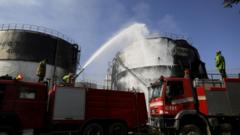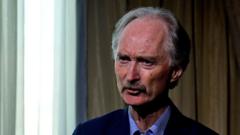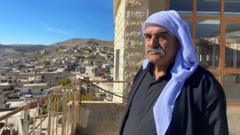On December 10, 2024, Prime Minister Benjamin Netanyahu entered a packed courtroom in Tel Aviv to testify in his lengthy corruption trial, facing accusations of bribery, fraud, and breach of trust. The trial represents a significant moment in Israeli history, as Netanyahu has been investigating for nearly a decade. Now Israel's longest-serving prime minister and influential political figure, he transforms into a defendant, an event marked by heavy media attention and public interest.
Netanyahu Testifies in Corruption Trial Amidst Ongoing Military Campaigns

Netanyahu Testifies in Corruption Trial Amidst Ongoing Military Campaigns
Israeli Prime Minister Benjamin Netanyahu faces corruption charges as he takes the stand in a trial that has lasted four years, all while managing ongoing military actions in the region.
During the proceedings, Netanyahu asserted his commitment to the truth, stating, “I have waited eight years for this moment — to tell the truth, the truth as I remember it.” Responding to the gravity of the situation, Judge Rivka Friedman-Feldman reminded him of his legal obligation to present the truth in testimony, indicating the seriousness of the case.
The prosecution has built a complex narrative surrounding the alleged misconduct of Netanyahu, who remains a critical figure overseeing military operations in the region, including actions in Gaza and Syria, as well as Israel’s longstanding occupation of southern Lebanon. His trial not only highlights issues of governance and accountability in Israel but also raises questions about the intersection of political power and judicial processes in a nation where security and foreign policy decisions are often tied to internal political dynamics.
With public and political circumstances surrounding the trial and ongoing military actions at play, the outcome of the case could have significant implications for both Netanyahu's political future and the fabric of Israeli political life.
As this trial unfolds, it becomes essential to observe how it interplays with the ongoing complex dynamics of the Middle East region, reflecting the broader narrative of Israel's governance and international relations in a turbulent geopolitical landscape. The verdict may signal not just Netanyahu's fate, but also speak volumes about Israel's political climate and the rule of law.
The prosecution has built a complex narrative surrounding the alleged misconduct of Netanyahu, who remains a critical figure overseeing military operations in the region, including actions in Gaza and Syria, as well as Israel’s longstanding occupation of southern Lebanon. His trial not only highlights issues of governance and accountability in Israel but also raises questions about the intersection of political power and judicial processes in a nation where security and foreign policy decisions are often tied to internal political dynamics.
With public and political circumstances surrounding the trial and ongoing military actions at play, the outcome of the case could have significant implications for both Netanyahu's political future and the fabric of Israeli political life.
As this trial unfolds, it becomes essential to observe how it interplays with the ongoing complex dynamics of the Middle East region, reflecting the broader narrative of Israel's governance and international relations in a turbulent geopolitical landscape. The verdict may signal not just Netanyahu's fate, but also speak volumes about Israel's political climate and the rule of law.


















